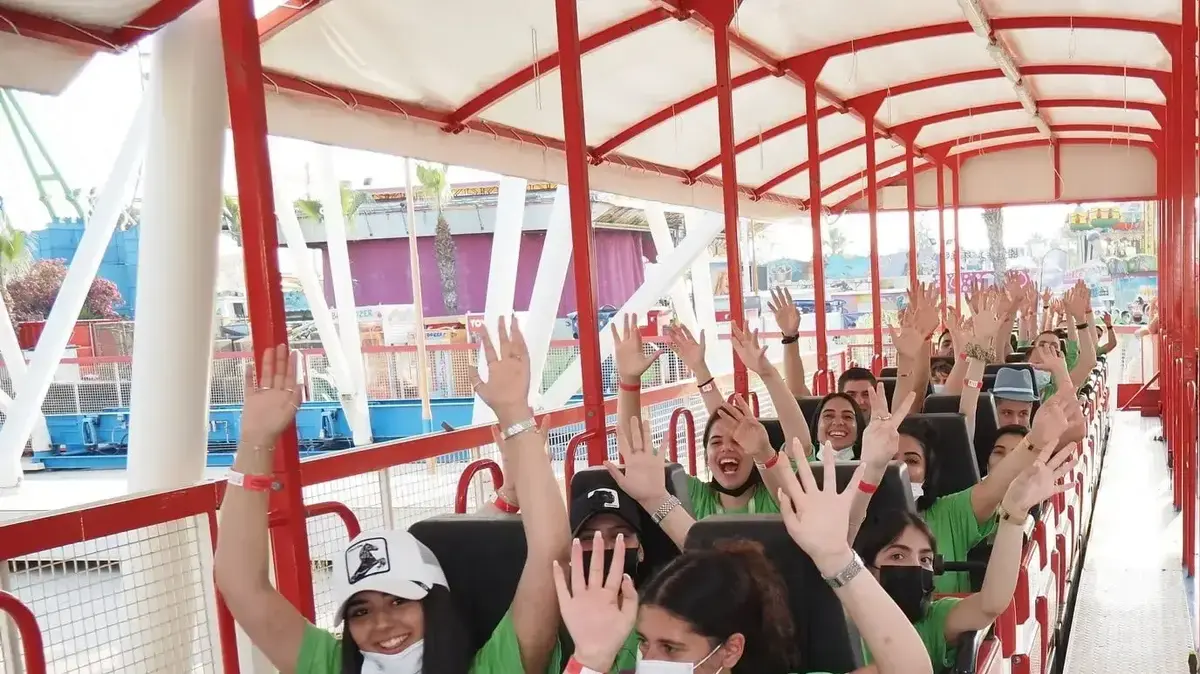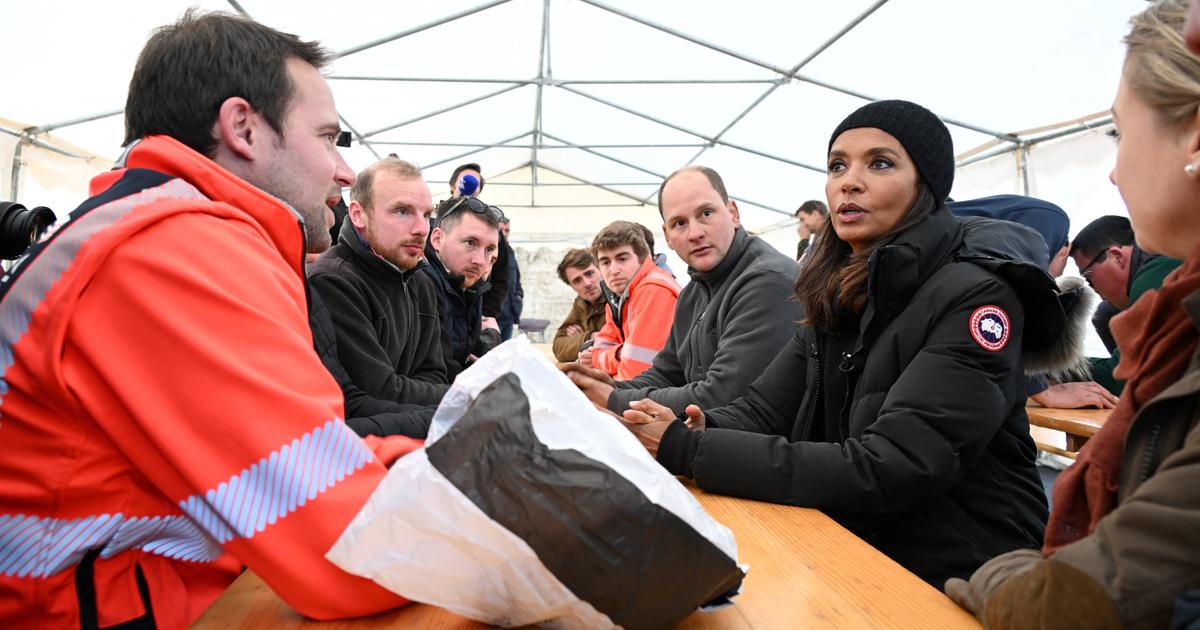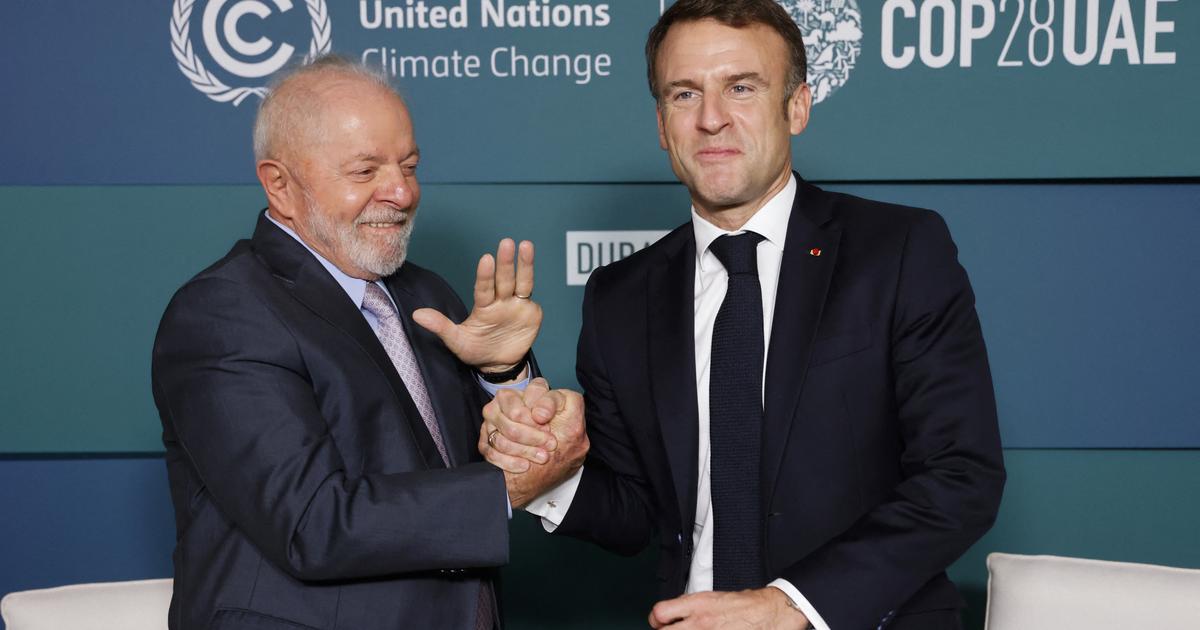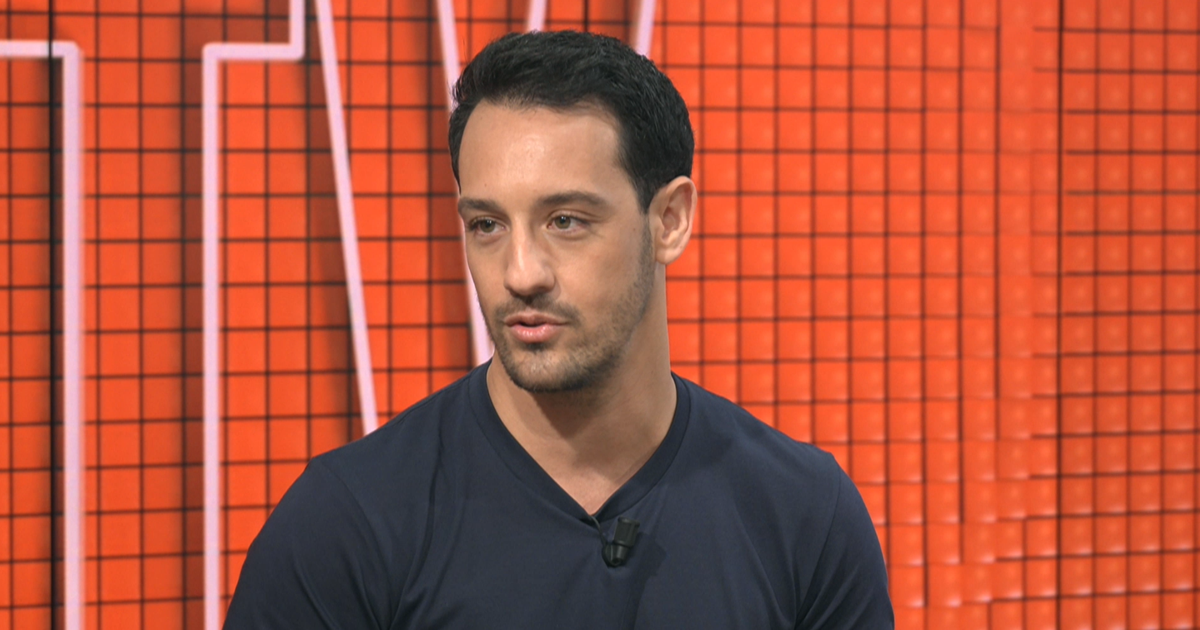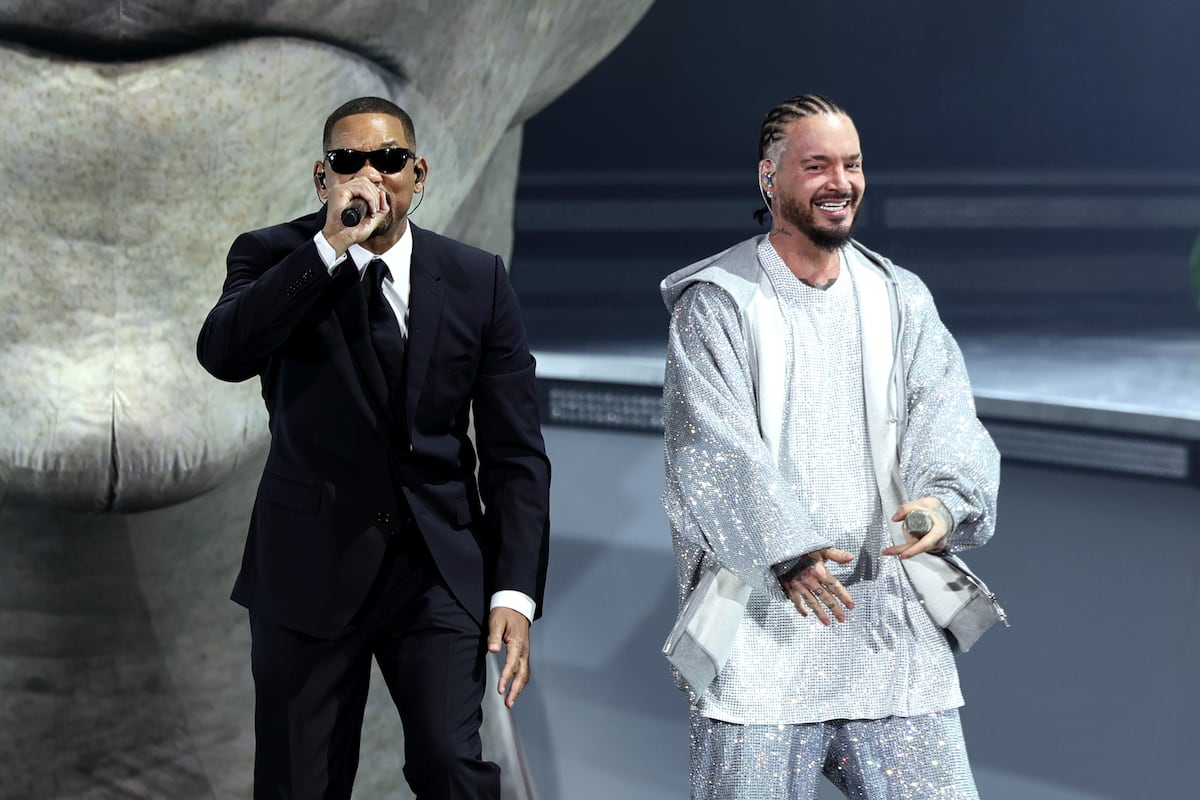He walks along the seafront without a passerby paying attention.
Brown djellaba, trendy sneakers, neon laces and Batman cap.
Mehdi Belhocine assumes the mix of genres: “Here, I dress as I want, nobody cares.
In France, I have already been given glances.
"
The thirty-something sits on a terrace of the marina, overlooking the sea and the bodies that tan.
The sun is saying its last words in this popular area of Dubai, where the entrepreneur has been renting an apartment for a few months.
The young Franco-Algerian is using mint tea.
“It's been six years since I discovered the city and that I come there regularly.
It was about time I moved in for good.
"
"Part of the people didn't want me"
Mehdi has created a method of learning Arabic online.
Its website is a hit.
At 32, the business manager claims to be a millionaire, he who, ten years earlier, did odd jobs in Alfortville (Val-de-Marne).
“I have all my life in France: my culture, my references, my friends… I did all my schooling there.
He was born in Algeria.
When he was 4, his parents fled the country and the civil war.
In the Parisian suburbs, he grows up “with his ass between two chairs”.
“I also have this Arab-Muslim culture.
In France, I no longer felt comfortable.
I felt like I had to choose between being French or Muslim.
"
At 24, hurt by what he calls "uninhibited racism in France", he tries to find his native land, Algeria.
“I have heard some
bougnoule
, going
back to your country
.
Some of the people didn't want me.
Too bad, I'm leaving.
»The return to the village stumbled.
He misses the comfort to which he had "become accustomed" in France.
Dubai presents itself as an ideal in-between.
In this city-world where 95% of the population is not Emirati, it is easy to mingle with the crowds.
Mehdi smiles: “It's the perfect mix between East and West.
"
In Dubai, here in the Marina district, marks of religious affiliation do not generate tension among the population.
LP / Frédéric Dugit
Earlier, the call to prayer sounded at the marina.
At the restaurant, some customers got up, others devoured their plates.
“Here there are prayer rooms everywhere, even at the mall.
I no longer have to wonder if I'm going to find a mosque somewhere.
In France, Mehdi was "still in trouble".
He evokes those evenings after work to "catch up with all the prayers of the day": "Spiritually, you are not feeling well.
"
This speech, the sociologist Stéphane Beaud heard it dozens of times.
His latest survey, "La France des Belhoumi" (Ed. La Découverte, 21 euros), traces the fate of eight children of an Algerian working-class family living in France since 1977. "The situation of tension between their host country and their country of origin is not new.
What is new is the display of Muslim identity, explains Stéphane Beaud.
When I interviewed immigrants in the 1970s, they didn't talk about this at all.
"
A sign of social success
For him, a move to Dubai “sounds like a social success for young people from working-class backgrounds”.
There, they want "to be able to be Muslims in a more peaceful and visible way without having the eyes of others".
How many French people, like Mehdi, have chosen the emirate?
Nabil Haryouli sees them parade on his Facebook group, Dubai tourism, which has 38,000 members: “It's impossible to quantify but it's a trend.
"
Morning essentials newsletter
A tour of the news to start the day
Subscribe to the newsletterAll newsletters
Today, 25,000 French people are registered with the French consulate in Dubai.
An indicative figure, since nothing obliges expatriates to make themselves known and their religion is never specified.
“For me, human rights mean being able to work, eat and build a home,” says Idriss, here in front of one of his sculptures.
LP / Frédéric Dugit
Idriss is one of them.
This 34-year-old Franco-Tunisian has been living here since 2019. He describes himself as the “basic commuter”, brought up in a house in Seine-et-Marne “in front of the HLM” by a French mother and a Tunisian father who harasses him : " When we want we can.
"He obtained a BTS in international business at 19 and flew to China with the" desire to eat the world ".
After fifteen years in Asia, he takes his wife and children to the United Arab Emirates (UAE).
We find him in one of the restaurants in sight, where the shisha is smoked in bling-bling outfit.
Behind him, a tiger statue claws the edges of an infinity pool.
It is signed Idriss B, her artist name.
“I'm not the typical artist with messy hair and ripped jeans full of paint.
He prefers Bermuda shorts below the knee and a baseball cap.
"In France, it's more complicated since September 11"
France, he will not return.
He loves it ".
“But that doesn't mean I don't see his flaws.
"Idriss says:" The Arabs are no longer popular in France.
It's not a secret.
Until France 98, it was fine.
It's more complicated since the September 11 attacks… ”
It is quite the opposite in Dubai.
“Here my children are free to do whatever they want as Muslims.
If they are doing Ramadan, no one will notice them.
Idriss lives "very well" in the emirate.
“For me, human rights mean being able to work, eat and build a home.
It is the possibility of having a car without having me scratched it, that my wife can walk in the street without being afraid of being attacked, that my children are safe.
Maybe we can't criticize and speak ill of everything here.
But we are fine.
"
In red, the city of Dubai, north of the United Arab Emirates.
Google maps
The government cultivates its liberal image to attract Westerners, even non-Muslims.
Islamic law has been relaxed in recent months to allow unmarried couples, for example, to live together, but the Muslim religion largely permeates the country's rules.
In restaurants, it's hard to find anything other than hallal meat.
Idriss salivates: “I don't even ask myself any more questions, it's very pleasant.
"
That afternoon, he orders food and drink.
The restaurant menu offers a wide choice of "mocktails", these cocktails without liquor.
"There too, it's easier for me," says the one who does not drink a drop.
He takes a sip before speaking about his statues.
The restaurant bought quite a lot.
A golden tiger transported by helicopter between the towers of the marina, a huge gorilla between the tables, a monkey on the edge of the swimming pool… The largest costs 35,000 euros.
Idriss calculates: “I have more than twenty projects at the moment.
Two years earlier, he was selling luxury store windows and creating statues… for his friends.
Today, he makes a living from his art.
"An economic eldorado"
The father of the family is "convinced" that he would not have "broken through so quickly" elsewhere.
“For business, Dubai is ideal.
His story is a fairy tale.
One afternoon, during a walk in a neighborhood, he shows photos of his works to the employee of the “Infos” hut.
“He told me he would talk about it,” recalls Idriss.
The next day I was called back.
I was given a chance, even without being known.
"
Stéphane Beaud agrees: “The emirate also appears to be an economic El Dorado, we must not focus everything on religion.
The sociologist compares these strategies with those of "engineers who previously went to live in Silicon Valley."
"The Declinist discourse on France does not make young people who have an entrepreneurial spirit want to stay," he judges.
Nadé Blata and her husband, Marc, moved to Dubai two years ago.
They do not intend to return to France.
LP / Frédéric Dugit
"For my generation, that of young Muslims, there is not much to do in France," adds Nadé Blata.
This mother remembers: “When my grandfather arrived in France, he immediately found work.
Today it is difficult.
"
In her luxurious villa, between the great towers of Downtown and the desert, the thirty-something has "succeeded".
"Anyway, if you don't work, you don't eat here."
Before landing in Dubai two years ago, the entrepreneur, specializing in the online sale of cosmetics, was working on a mobile application project.
“It was super complicated, I was rowing.
“We advise him to go to the emirates for business.
“Contact is easy.
Everyone is very hardworking here.
So you meet people faster, your projects are moving forward.
"
"The religion side without the strict side as in Saudi Arabia"
The 36-year-old Frenchwoman grew up in a lodge in a family of Algerian origin "full of love", near Roissy (Val-d'Oise).
His two parents work at the airport: executive father, mother commercial secretary.
She meets her husband who converts, for her, to Islam.
Three children later, they put their suitcases in the Persian Gulf.
Driver, nannies at home… This elegant brunette, perched on heels, offers herself the high life in a country where she can "live [her] religion more easily".
“We could have gone to another Muslim country but it's less interesting for business.
Here, there is the religion side without the strict side, not like in Saudi Arabia.
"
What about human rights?
Nadé feels “free from everything” in Dubai.
“On my visa it says that I am a Muslim so I am not allowed to buy or consume alcohol.
But that's what I wanted.
And then the others, they do what they want.
"
The UAE government has relaxed its laws to attract Westerners.
LP / Frédéric Dugit
From France, Nadé hears a lot of questions.
“My in-laws especially, they always wonder if they can take a jersey to come.
Whereas here there are girls in thongs on the beach!
"
The business manager does not wear the veil, "even if that would have been no problem here".
“There is no discomfort about that.
No discrimination in your work ”, explains Nadé, between two sips of alcohol-free mojito.
“In France, the doors are closed for women graduates who wear the veil, observes Stéphane Beaud.
Going to Dubai is a solution to unblock the situation.
"
The “pearl” of the emirates also ticks the “education” box.
Nadé dreamed of giving her three children a religious background.
But in private Muslim schools in France, she had "the impression that the educational aspect took a back seat to the religious".
Nadé “doesn't want to choose”.
“I wanted them to have both.
As in Dubai.
Even if it means paying 35,000 euros per year for all the siblings.
“It's expensive but I know where my money is going.
"
READ ALSO>
Covid-19: how Dubai manages to attract tourists fleeing curfew and containment
Does she practice her religion more than before?
Not really.
“We said to each other with my husband that we went less to the mosque than in France.
Life goes so fast here, we have less time.
"
The chic businesswoman doesn't know how long she will stay.
One thing is certain: she will no longer come back to live in France, where she says she is "racketed by taxes".
Too bad if, in the emirate, foreign residents do not receive any state aid for school or health.
Nadé no longer even has a vital card: “Once you have left France, you must leave everything that binds you to it.
I make it a point of honor.
If you leave, you don't go back to scratch.
"



